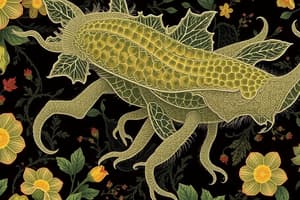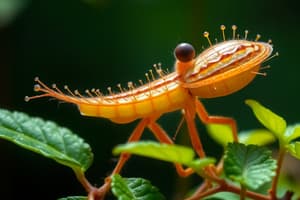Podcast
Questions and Answers
Which components are fundamental to the makeup of living matter?
Which components are fundamental to the makeup of living matter?
- Calcium, potassium, magnesium, and sodium
- Hydrogen, helium, lithium, and beryllium
- Carbon, hydrogen, nitrogen, oxygen, sulfur, and phosphorus (correct)
- Gold, silver, copper, and iron
Which characteristic is NOT associated with living organisms?
Which characteristic is NOT associated with living organisms?
- Ability to maintain homeostasis
- Inability to reproduce (correct)
- Growth and change in size and shape
- Response to environmental stimuli
What does the branch of 'Taxonomy' focus on?
What does the branch of 'Taxonomy' focus on?
- The study of tissue organization
- The examination of cell structures
- The study of plants and their traits
- The classification and naming of organisms (correct)
Which branch of biology studies the internal structure of organisms?
Which branch of biology studies the internal structure of organisms?
Which of the following branches of biology focuses on the study of microorganisms?
Which of the following branches of biology focuses on the study of microorganisms?
What is the primary focus of 'Cell Biology'?
What is the primary focus of 'Cell Biology'?
Which of the following is a characteristic that all living organisms share?
Which of the following is a characteristic that all living organisms share?
What is the primary goal of medicine?
What is the primary goal of medicine?
Which field is described as an area for cultivating crops or for livestock?
Which field is described as an area for cultivating crops or for livestock?
Which characteristic refers to how living organisms respond to changes in their environment?
Which characteristic refers to how living organisms respond to changes in their environment?
What is the focus of aquaculture as mentioned in the content?
What is the focus of aquaculture as mentioned in the content?
What does horticulture primarily deal with?
What does horticulture primarily deal with?
How is forestry defined in the content?
How is forestry defined in the content?
Which of the following describes a farm?
Which of the following describes a farm?
What does animal sciences education primarily prepare students for?
What does animal sciences education primarily prepare students for?
What aspect of the environment do maintainable fisheries aim to protect?
What aspect of the environment do maintainable fisheries aim to protect?
What is the primary focus of embryology?
What is the primary focus of embryology?
Which branch of biology specifically studies the inheritance of traits?
Which branch of biology specifically studies the inheritance of traits?
How does biophysics relate to biology?
How does biophysics relate to biology?
What does biogeography primarily study?
What does biogeography primarily study?
Which statement about bio-economics is accurate?
Which statement about bio-economics is accurate?
What role does biostatistics play in biological research?
What role does biostatistics play in biological research?
Which of the following best describes paleontology?
Which of the following best describes paleontology?
Which career is most related to ecology?
Which career is most related to ecology?
Which scholar is known as the father of Arab chemistry?
Which scholar is known as the father of Arab chemistry?
What significant theory was associated with Jabir Bin Ayyan in the context of matter?
What significant theory was associated with Jabir Bin Ayyan in the context of matter?
Which of the following areas did Abd al-Malik contribute to?
Which of the following areas did Abd al-Malik contribute to?
Which one of the following works is attributed to Bu Ali Sina?
Which one of the following works is attributed to Bu Ali Sina?
What event prompted Abu Usman Aljahiz to return permanently to Basrah?
What event prompted Abu Usman Aljahiz to return permanently to Basrah?
What distinguishes the Kingdom Prokaryote from other kingdoms?
What distinguishes the Kingdom Prokaryote from other kingdoms?
Which characteristics are typical of organisms in the Kingdom Protista?
Which characteristics are typical of organisms in the Kingdom Protista?
Which kingdom includes organisms such as mosses, ferns, and flowering plants?
Which kingdom includes organisms such as mosses, ferns, and flowering plants?
What is a primary characteristic of the Kingdom Fungi?
What is a primary characteristic of the Kingdom Fungi?
Which statement correctly describes the Kingdom Animalia?
Which statement correctly describes the Kingdom Animalia?
Who developed the five kingdom classification system?
Who developed the five kingdom classification system?
What is not a characteristic of the Kingdom Plantae?
What is not a characteristic of the Kingdom Plantae?
Which of the following is true regarding the classification system developed by Whittaker?
Which of the following is true regarding the classification system developed by Whittaker?
Flashcards are hidden until you start studying
Study Notes
What is Biology?
- Biology is the study of living organisms.
- It explores their morphology, physiology, anatomy, behavior, origin, and distribution.
- A living organism can be made of a single cell (e.g., bacteria) or multiple cells (e.g., animals, plants, fungi).
What is Life?
- Life emerges from various chemical combinations like carbon, hydrogen, nitrogen, oxygen, sulfur, and phosphorus.
- These elements form nucleic acids, proteins, carbohydrates, and lipids, essential components of living matter.
Characteristics of Life
- Responsiveness: Living organisms react to their environment through nerve impulses.
- Growth and Development: Organisms increase in size and change their shape through cell division.
- Reproduction: Living things create offspring, ensuring the continuation of their species.
- Metabolism and Respiration: Organisms carry out chemical processes like metabolism and respiration for energy.
- Homeostasis: Living things maintain a stable internal environment through processes like excretion and absorption.
- Cellular Organization: All living organisms are made of cells.
- Heredity: Traits are passed down from parents to offspring.
Main Branches of Biology
- Botany: The study of plants.
- Zoology: The study of animals.
- Microbiology: The study of microorganisms.
- Taxonomy: The science of identifying, naming, and classifying organisms.
- Morphology: The study of the external form, size, shape, color, structure, and relative position of an organism's living organs.
- Anatomy: The study of internal structure.
- Histology: The study of tissue organization and structure.
- Cytology: The study of the form and structure of cells, including the behavior of the nucleus and other organelles.
- Cell Biology: The study of various aspects of cells, including morphology, organization, biochemistry, physiology, genetics, development, pathology, and evolution.
- Molecular Biology: The examination of the organization, synthesis, functioning, and interactions of biomolecules.
- Physiology: The study of body functions and processes.
- Embryology: The study of fertilization, growth, division, and differentiation of a zygote into an embryo.
- Ecology: The study of living organisms in relation to other organisms and their environment.
- Genetics: The study of inheritance of traits and variations.
- Evolution: The study of the origin of life and the development of new species.
- Paleontology: The study of fossils and the remains of past organisms.
- Virology: The study of viruses.
Linkage of Biology to Other Disciplines
- Biochemistry: Explores the interactions of atoms, molecules, and compounds within living organisms and their environment.
- Biophysics: Studies life at multiple levels, from atoms and molecules to cells, organisms, and environments.
- Biogeography: Examines the distribution of species and ecosystems in geographic space and over geological time.
- Biostatistics: Utilises statistical analysis to gain understanding of biological processes.
- Bio-economics: Integrates economics and biology to develop theories that explain economic events on a biological basis and vice versa.
Careers in Biology
- Marine/Aquatic Biology: Studies marine and aquatic organisms.
- Zoo Biology: Focuses on the study of animals.
- Conservation Biology: Works to protect endangered species and ecosystems.
- Ecology and Environmental Management: Studies interactions between organisms and their environment.
- Medicine and Surgery: Involves diagnosing, treating, and preventing diseases, and conducting medical research.
- Fisheries: Manages and develops sustainable fisheries and aquaculture.
- Agriculture: Focuses on cultivating crops and raising livestock.
- Animal Science: Brings expertise to animal breeding, food production, nutrition, animal farming, and animal welfare.
- Horticulture: Encompasses the science and art of cultivating plants for food, ornament, or other purposes.
- Forestry: Manages and studies forests and related natural resources.
- Farming: Involves producing food and other agricultural products.
The Five Kingdom System of Classification
- Developed by Robert H. Whittaker in 1969.
- Built on the work of previous biologists like Carolus Linnaeus.
- Kingdom Prokaryote: Includes bacteria and blue-green algae (Cyanobacteria).
- Kingdom Protista: Consists of simple eukaryotic organisms, often single-celled or forming colonies.
- Kingdom Fungi: Includes microorganisms like yeasts and molds, as well as mushrooms.
- Kingdom Plantae: Consists of land plants such as mosses, ferns, conifers, and flowering plants.
- Kingdom Animalia: Contains all animals.
The Holy Quran and Biological Science
- The Quran includes verses that are interpreted to contain biological information.
- Some interpretations suggest connections to concepts like embryology and genetics.
Important Muslim Scientists and their Contributions
- Abu Zakariya Yahya Ibn Muhammad Ibn Al-Awwan: A 12th-century Islamic scholar who made significant contributions to the field of agriculture.
- Jabir Bin Ayyan (Geber): Considered the father of Arab chemistry and a founder of modern pharmacy.
- Abd al-Malik ibn al-Quraib al-Asmai: One of the first Muslim scientists to contribute to Zoology, Botany, and Animal Husbandry.
- Bu Ali Sina (Avicenna): A Persian physician and philosopher who wrote influential medical texts like "The Book of Healing" and "The Canon".
- Abu Usman Aljahiz: A scholar who studied diverse topics, including the natural world.
- Al-Farabi: A philosopher who wrote about various subjects, including biology.
Studying That Suits You
Use AI to generate personalized quizzes and flashcards to suit your learning preferences.






